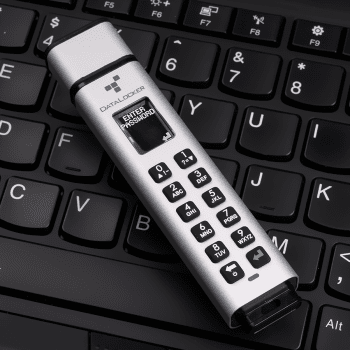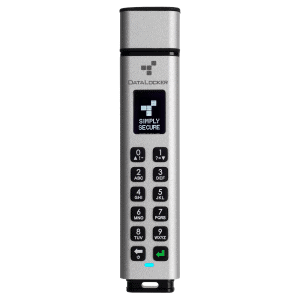
Alphanumeric passwords, central administration and the new SilentKill function ensure the protection of stored data in the DataLocker Sentry K350: the hardware-encrypted microSSD drive.
DataLocker, manufacturer of secure USB storage solutions and central USB management software, is introducing the DataLocker Sentry K350, the latest model in its Sentry product family. As with the predecessor Sentry K300, the DataLocker Sentry K350 is a hardware-encrypted microSSD drive that can be connected like a USB stick. The built-in microSATA SSD enables data transfer rates that are up to four times as high as with comparable flash-based products. Among other things, the new model offers the option of configuring a “self-destruct mode” or deleting data in certain situations using the “SilentKill function”. Thanks to an IP67 certification, the new DataLocker Sentry K350 is even better protected against environmental influences and can be cleaned more easily if necessary - an important aspect, for example when sharing under Corona conditions.
Small device with a strong OLED display
At first glance, the 10 cm long and 2 cm wide Sentry K350 differs from its competitors. Thanks to the integrated OLED display and the easily understandable user menu, operation is deliberately kept simple and self-explanatory for administrators and users. No manual is required for operation and employee training courses, in which, for example, the meaning of flashing LEDs or acoustic signals have to be learned, are also not required. Alphanumeric passwords, which can also contain special characters, can be entered using the integrated keypad. This is important because alphanumeric passwords are an essential part of security policies for many organizations.
Brute force protection with "self-destruct mode"
The new Sentry K350 is equipped with protection against so-called brute force attacks in the form of a "self-destruct mode". The administrator can set after how many incorrect password entries (default 10, maximum 50) the self-destruction should be triggered. In addition, it can be determined whether only the reset to the delivery status or the so-called "detonation" should take place. When resetting, the AES key and the data are irretrievably deleted. When detonated, the firmware is also deleted, making the drive completely unusable.
SilentKill function to protect data in threatening situations
Similar to the DataLocker hard drive DL4 FE, the DataLocker Sentry K350 now also has the special SilentKill security feature. Entering a special PIN code immediately deletes the device. SilentKill can be used, for example, when company employees are forced to hand over the hard drive and authenticate on business trips. Similar to the self-destruction mode, it can be configured in advance whether the drive is to be completely destroyed (detonation) or only the data is to be deleted.
Physical security: FIPS 140-2 Level 3 certified
The Sentry K350 is FIPS 140-2 Level 3 certified. This means, among other things, that the drive cannot be opened without destroying the PC board and the encryption chip. The drive is also suitable for harsher environments, as it is protected against the ingress of dust and temporary immersion (up to 67 minutes in a water depth of up to one meter) according to the IP30 standard. This is also important in times of Covid-19, as drives that are used by several employees can be safely cleaned without damaging the device. The DataLocker Sentry K350 has also been successfully tested according to the US military standard MIL-STD-810. It is about the compatibility of devices that are exposed to extreme temperatures, moisture, vibrations and other influences.
Optional central administration via SafeConsole
Sentry K350 can either be used as a "standalone device" or in conjunction with the central USB device management solution SafeConsole. This increases the level of security, especially in the case of special compliance requirements, and at the same time significantly reduces the administrative effort, especially with a larger number of drives. For example, IT administrators can use SafeConsole to easily set secure policies for USB drives and remotely delete stolen or lost devices. You can also reset passwords or audit drives to check which files have been added, removed or changed on the device. With the PortBlocker option, SafeConsole administrators can also remotely block USB ports on end devices or allow their use, for example the Sentry K350, based on their VID / PID (Vendor ID / Product ID) and serial number. In addition, McAfee® anti-malware protection can optionally be integrated into the firmware of the secure USB drives to scan and isolate or delete malicious files.
More at DataLocker.com
About DataLocker DataLocker is an innovative manufacturer of data encryption solutions. The extensive portfolio includes external, hardware-encrypted mass storage devices, virtual encrypted drives, as well as central USB device management solutions that are provided as on-premises or cloud solutions. DataLocker products can support the implementation of security guidelines and ensure compliance with legal requirements (e.g. sub-areas of the GDPR / General Data Protection Regulation).
Matching articles on the topic

